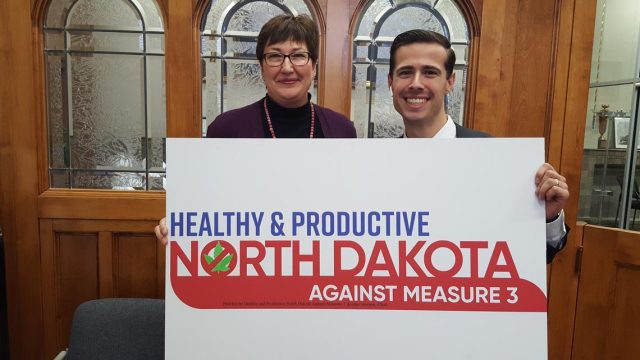North Dakotans Vote Down Recreational Marijuana but Re-Elect Drunk Drivers

This letter to the Fargo Forum from Aaron Forde, reacting to my post yesterday about the forgiving attitude North Dakota voters seem to have for politicians who behave irresponsibly with alcohol, makes a lot of sense.
Forde points out that, even as North Dakota voters cast their ballots for drunk drivers on the statewide and local ballots, they voted down Measure 3 on the idea that it would have detrimental societal impacts.
For the last 6 months we have heard propaganda from the Anti-Measure 3 partisans that legalizing recreational marijuana would turn North Dakota into the “Wild West” with every pot smoker driving and crashing into churches and children. Meanwhile, there are politicians convicted of alcohol DUIs within the last month that are re-elected by their constituents. And apparently this is a common occurrence in North Dakota.
Where are the leaders of “Healthy and Productive North Dakota Against Measure 3” and “North Dakotans Against the Legalization of Recreational Marijuana” openly campaigning against Walsh County Commissioner Ernest Barta and North Dakota Rep. Craig Headland, R-Montpelier, the politicians mentioned by Port who were convicted of DUIs (with Barta crashing into a telephone pole and driving away) within the last month? Nowhere from what I can tell.
He’s got a decent point.
I’m actually supportive of the forgiving attitude North Dakota voters seem to have for politicians who struggle with alcohol. Part of that is probably my generally libertarian outlook. I don’t have much use for sanctimony. Another part is the fact that I, too, have sinned in this way. I got a DUI a few years ago. I’m ashamed of it, and I make no excuses for my behavior, but I can understand that good people can make terrible decisions that shouldn’t necessarily define who they are.
But it’s hard to reconcile that forgiving attitude with a prudish outlook on marijuana. To the extent that prudishness is what we can blame for Measure 3 failing on the ballot.
I still believe that a majority of North Dakotans support more liberalized marijuana policies, based in no small part on the strong majority of voters who cast their ballots to approve medical marijuana in the 2016 cycle. Measure 3’s failure wasn’t a product of anti-marijuana sentiment, I think, but rather that the measure itself was confusing and had some very deep flaws.
A better written measure would have passed.
If the opponents of legalizing recreational marijuana are counting on moral arguments against it carrying the day going forward, they’re badly mistaken. Legalization is coming. The only question is when.




